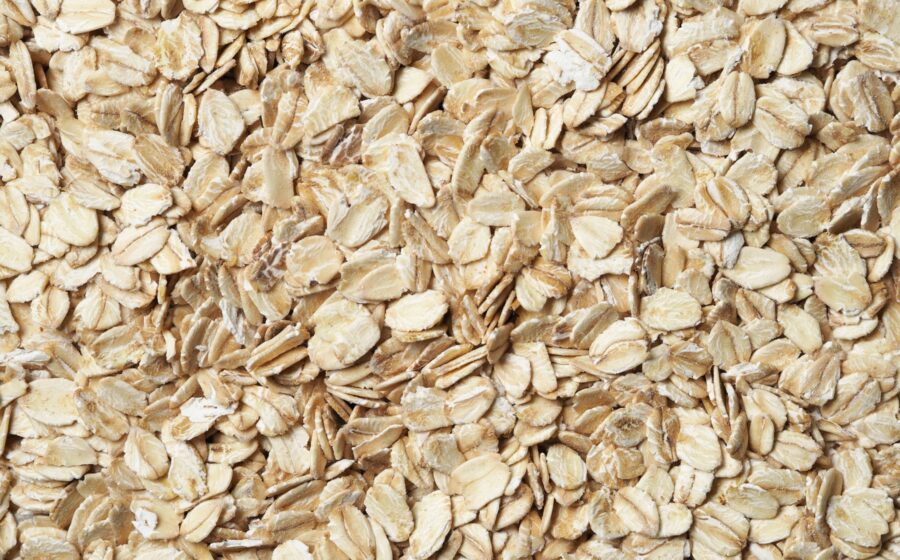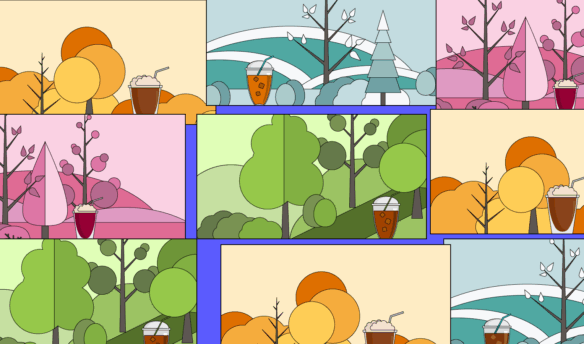Over the last seven years, oat milk has exploded in popularity across the U.S., Europe, Asia, and Latin America, kicked off by the Swedish company Oatly’s appearance on the market in 2017. Uptake was swift: Between 2019 and 2020, the consumption of oat milk increased by 50% or more in places like the U.S., Vietnam, Germany, and Sweden. Though market saturation has slowed oat milk’s momentum in the mid-2020s, the global appetite for oat milk remains high, with its value projected to reach $6.8 billion by 2026.
Yearly oat milk sales have even surpassed soy milk, the previous forerunner. “Oat milk is the most-purchased plant-based milk in the U.K.,” says Nicola Spalding, a trends analyst and content writer. “Oats have a mild, neutral flavor, unlike soy, which often tastes quite “beany”; they’re rich in fiber, especially beta-glucan, and they have good functionality in terms of creaminess and mouthfeel,” she says.
Oat milk’s adoption is also driven by consumers’ growing desire for options that are considered more sustainable. Oats’ ability to grow worldwide opens potential for local sourcing, just as it opens oats up to meet climate-change-driven supply challenges.
More broadly, in the world of food technology, oats’ versatility is paving the way for plant-based applications beyond liquid beverages. But with oat milk now on nearly every cafe menu, have we reached peak oat?
Spoiler Alert: Probably Not
Oat milk latte, anyone? Many consumers like oat milk because it closely mimics the taste and texture of dairy milk, unlike other alternative plant milks of the past.
As one barista wrote on Reddit, “My first experience with oat milk was actually making a non-dairy version of eggnog for my [lactose-intolerant] boyfriend. Let me tell you, the texture made him cry.” The Reddit user also talked about using oat milk at their job: “Not only was my latte art on point but it complimented [sic] every blend of bean we had.”
There’s nothing the dairy industry would like more than to see us go away. Christian Christensen, DRYK
Consumers are also drawn to oat milk for its lower environmental impact compared with dairy and other alternative milks—and the dairy industry has taken notice. The consumption of dairy milk decreased by 4% while the consumption of non-dairy milk, including oat, rose by 5% between 2022 and 2023. In the wake of this news, Big Dairy has often called out data showing the stagnation of plant-based milk sales, and has even sponsored parodies touting “wood milk” as the next big thing.
“There’s nothing the dairy industry would like more than to see us go away,” says Christian Christensen, CEO of the Danish plant-based milk company DRYK. (Of course, we should also keep in mind that while oat milk has a lower carbon footprint than dairy milk, coffee production itself is resource-intensive and produces a significant amount of greenhouse gases.)
Brands are increasingly seeking the stamp of approval from baristas, which has resulted in many oat milk options formulated to steam well. Oatly, DRYK, Alpro, and Minor Figures are among the brands, big and small, offering oat milks specifically developed for use by baristas, meaning they contain a higher fat content to create more stable foam. According to Ghost Town Oats, baristas themselves “were at the forefront and catalysts of the oat milk craze.” Founded by three baristas itself, Ghost Town Oats positions itself as a lifestyle brand in which oat milk is a key pillar, riffing that its oat milk “haunt[s] over 500 coffee shops and neighborhood markets across the US and Toronto.”
Oat milk brands have also largely redefined a crop once seen mainly as a breakfast food into something edgy and even techy. For example, Oatly has long been known for its tongue-in-cheek brand voice that acknowledges its “haters” head-on, and Minor Figures’ site makes its impact reports available under a site page called Source Files, designed to look like a computer terminal.
But Minor Figures, for example, hasn’t been immune to sourcing issues that increased raw material prices in 2023, and climate change will continue to complicate availability: Despite steady demand for oat milk, USDA data shows an overall 24% decrease in production between 2022/2023 and 2023/2024. Drought, for one thing, has already impacted oat harvests and led to shortages, especially in Canada, the world’s third-largest producer after the EU and Russia. Researchers have already begun exploring drought-resistant oat varieties.
At the same time, there are efforts to commercialize the current oat supply for use in a wider range of consumer products. Food tech companies are already using modern processing techniques that can improve oat quality in storage, as well as the textural and nutritional properties of oats for use in future foods.
Beyond Oat Milk
What else can “oat,” you ask? Oat-based products are popping up in a wide range of unexpected forms and food groups—and there’s no reason we won’t one day see them in cafes.
Oat Milk Sheets and Pastes
Both the Germany-based Veganz Group and U.S.-based Milkadamia now offer printed oat milk sheets, developed to extend oat milk’s accessibility for at-home consumers. “You put them in a blender with water to transform them into milk, which also means they’re customizable, because you can make everything from oat paste to cream to milk,” says Spalding.
With the increased awareness of ultra-processed foods and the growth in clean eating, I wouldn’t be surprised if oats continue to gain popularity as a nutritious, whole-grain food. Nicola Spalding, trends analyst and content writer Nicola Spalding, trends analyst and content writer
Meanwhile, the U.K.-based MYOM has developed an oat paste it calls “suitcase-friendly” oat milk—you can throw it in your bag and then mix it with water to make an oat-milk-like substance. The company says the product is shelf-stable and helps reduce packaging, lowering transport emissions in the process.
Dairy Products
Beyond milk alone, oat-based butter and cream cheese are increasingly being marketed to vegans as dairy substitutes. This includes Oatly’s plant-based Creamy Oat Spread and Miyoko’s Creamery Oat Milk Butter.
Such plant-based products show no signs of losing popularity, either. Although some consumer reviews currently note these products’ high price points, they might one day join plant-based creamers in cafe fridges as a go-to vegan option for bagels and other light bites.
Chocolate
Brands like Oatly and DRYK offer chocolate oat milk as an alternative to traditional chocolate milk. But that’s not the only way oats and chocolate go together. The U.K.’s H!P Chocolate came on the scene at the height of oat milk mania in 2021, marketed as “plant-based” and “next-generation chocolate” due to its use of oat milk instead of dairy milk. The brand names sustainability and the pursuit of better vegan options among its foundational raisons d’être.
Some are going even further, asking whether chocolate itself can, well, oat. German startup Planet A Foods has pursued “cocoa-free chocolate” called ChoViva, using a combination of roasted oats and sunflower seeds to create depth of flavor. The startup has already partnered with major German brands to incorporate ChoViva into products like muesli and candy.
Meat Substitutes
Swedish startup Millow has developed a meat substitute composed of roughly 50% mycelium (the root structure of mushrooms) and 50% oats. “We chose oats as a cornerstone of our products not only for their exceptional nutritional benefits but also for their abundant availability and sustainability in Scandinavia,” says Dr. Coralie Hellwig, Millow’s co-founder and chief product officer.
“By marrying these premium oats with mycelium—a transformative ingredient that enhances texture and flavor—we’ve crafted a hybrid product that is nutritious, versatile, and environmentally friendly,” she adds. Some cafes already serve up vegan burgers, so who’s to say they can’t be oat-based?
Will Oat Continue To Reign Supreme?
As people become increasingly concerned about the health and environmental impacts of their dietary choices, oats offer potential. “With the increased awareness of ultra-processed foods and the growth in clean eating, I wouldn’t be surprised if oats continue to gain popularity as a nutritious, whole-grain food,” says Spalding.
Although Spalding says that “plant-based funding has slowed down considerably over the past 12–18 months,” she cites companies like Millow, Veganz, and the Singapore-based Oatside, which describes itself as “Asia’s first full-stack oat milk producer” and which recently raised $35 million in series B funding, as companies that are continuing to win over investors in an increasingly competitive environment.
Commercially, oats may someday face competition from crops with similar versatility and sustainable attributes, like peas, hemp—even buckwheat. Pea and hemp milk are already on the market, and pea protein has found its way into food tech applications like plant-based meats.
For the moment, it’s clear oats are a ripe area for innovation, “peak oat” be darned. “We believe oats will continue to play a pivotal role in the future of food technology,” says Hellwig. “Their unique combination of nutritional value, sustainability, and affordability makes them an indispensable ingredient in the ongoing plant-based revolution.”








